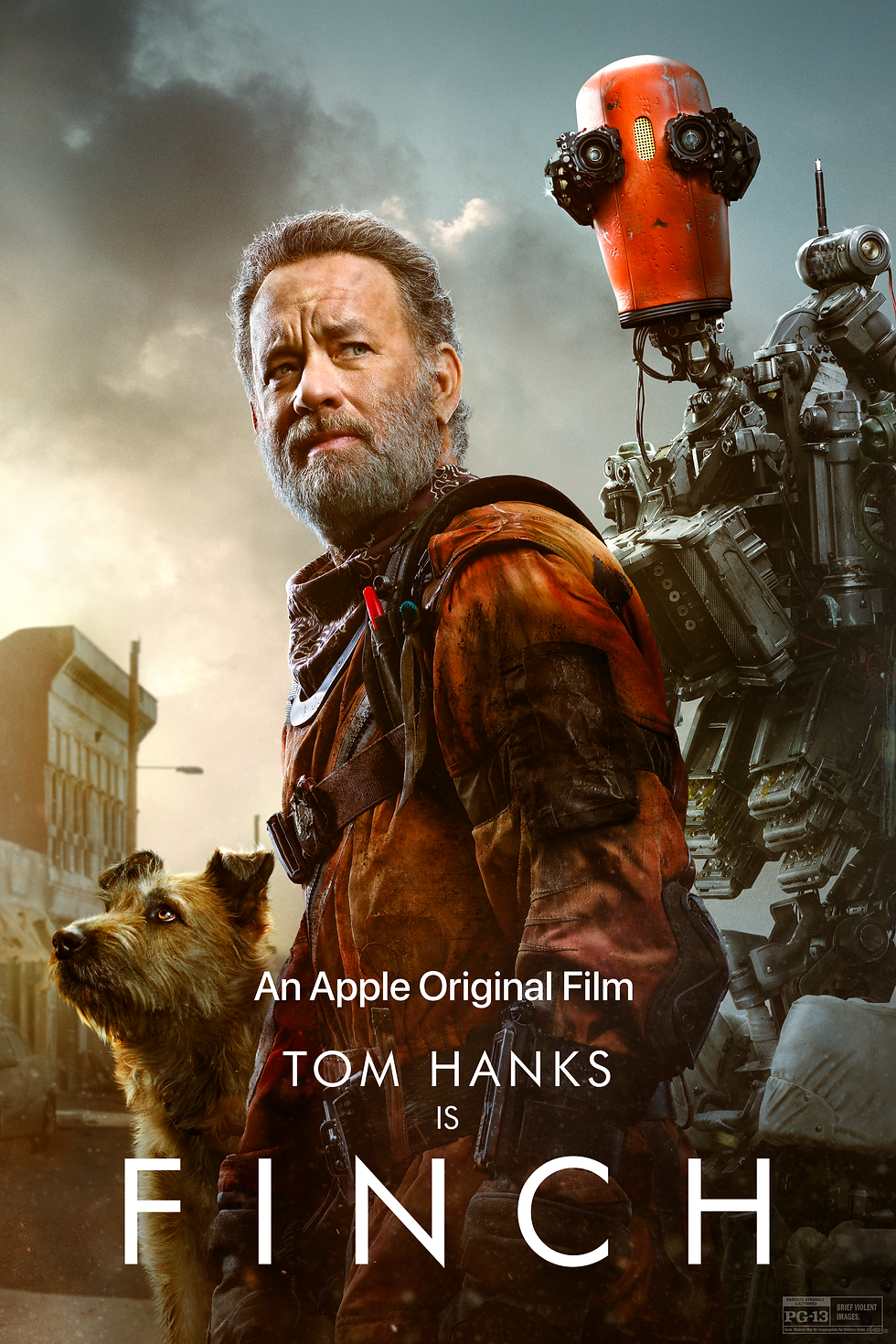Review: 'Finch'
- Drew Moniot

- Nov 4, 2021
- 4 min read

You wonder if Tom Hanks is capable of making a bad movie. Or even a mediocre one.
Sure, many point to Joe Versus the Volcano but that was released way back in 1991. Every great artist or performer has a misstep now and then. Since then, for Hanks, it’s pretty much been a non-stop string of hits.
Add Finch to the list. Near the top.
It’s a story set in a now-familiar post-apocalyptic world, a scorching wasteland with soaring temperatures and radiation levels. For once, there are no zombies or mutants.

The enemy here is the world itself which has become a brutally hostile environment, no longer conducive to human life.
The exception is Finch, a lonely tech-head who has managed to outsmart death by fashioning a bunker, a monster, demolition truck, and a small robot rover to help him survive. The Rover's name is Dewey (a nod to the 1972 sci-fi movie Silent Running that featured three small robots named Huey, Louie and Dewey). Several still-functioning wind generators supply power. A dog named Goodyear provides Finch’s only real companionship.
It’s been said that dogs are man’s best friend. That is particularly true when the dog is only living thing in Finch’s hostile, desolate world to provide emotional support.
It’s a powerful bond. Goodyear means everything to Finch, and when Finch suspects that he may be dying of radiation exposure, he sets about to create a long-term caretaker for the dog.

And thus, the robot Jeff is born. There have been many robots in the world of science fiction movies, back to the days of silent cinema (Metropolis, 1927). There was Robbie the Robot from Forbidden Planet (1956) and, jumping ahead, C3PO from Star Wars (1977).
Jeff shares much in common with C3PO in terms of appearance and personality. A rushed, incomplete download of information leaves him a tad less intelligent than C3PO.
Though Jeff physically resembles something constructed from an erector set and some spare parts, he is filled with facts and data.
What he initially lacks is the ability to walk and talk, but Finch patiently remedies that. Jeff’s greatest challenge is to learn what it is to be human. He must develop cognitive abilities and emotional sensitivity that will allow him to be Goodyear’s master and caretaker when Finch is gone.
An approaching superstorm sends the three of them on a journey to whatever is left of San Francisco, over a thousand miles away. It is a perilous journey.
Along the way, Finch must face his mortality and Jeff must develop something resembling humanness and humanity.

Admittedly, movies like this can run the risk of being schmaltzy or trite. We can guess much of the story arc going in. As with so many things, it’s all about the details. To its credit, Finch is heavy on details that make it an engrossing story.
The tale of a machine endeavoring to become a man is not unfamiliar. We’ve seen it before in movies like Bicentennial Man (1999) and A.I. Artificial Intelligence (2001). The concept traces back to the Pinocchio fairytale that Disney made famous in 1940.
The strength of Finch depends on the talent of the star portraying him. When you think if it in terms of human characters, it’s a single character story. Hanks has proven that he is more than capable of a performance like that in movies like Cast Away (2000).
The canine co-star in movies like this has to be just right. Seamus, who portrays Goodyear deserves a special Oscar.

But the third ingredient here is the creation of the robot, Jeff. He has to look like a man-machine, made of laboratory junk, a believable man-machine made of laboratory junk. In that regard, the special effects team offers up the perfect, digital co-star for Hanks.
Visual effects have been stunningly good in the last few decades and getting better and better. They have opened up whole new worlds of imagination.
The result here is a digital creation that looks absolutely, convincingly real.
Story-wise, Finch navigates a path that is sometimes playful and funny, other times suspenseful and dark, and at other times heart-wrenchingly emotional. As mentioned, you pretty much know where the story is going, but you’re along for the ride anyway. Director Miguel Sapochnik and writers Craig Luck and Ivor Powell know what it takes to bring you aboard this journey.

It is a movie with beautiful images and a keen sense of visual narrative. There is a surreal quality to the scenes with Hanks and his robot creation—strange, but completely convincing.
In technical terms, it’s a better film than Hanks’s recent Apple TV+ film Greyhound (2020) that featured navel battles that looked like video game sequences.
It would appear that Finch is a modestly-budgeted film. There was really only one, major on-screen star. Whatever was spent on location shooting and special effects was carefully planned. It’s richly detailed. It’s stripped down and simple. But it works.
It’s an emotional story that really pulls you in.
You might require a packet of Kleenex to get through the final reel. If you’re a dog lover, you might need two.
Finch is a lesson in unconditional love and caring and responsibility. It is a touching tale about learning to die and about the things you will leave behind.
It’s also a story about learning to be human and learning to love and be loved in the great circle of life.
Finch premieres globally on Apple TV+ November 5.







Comments